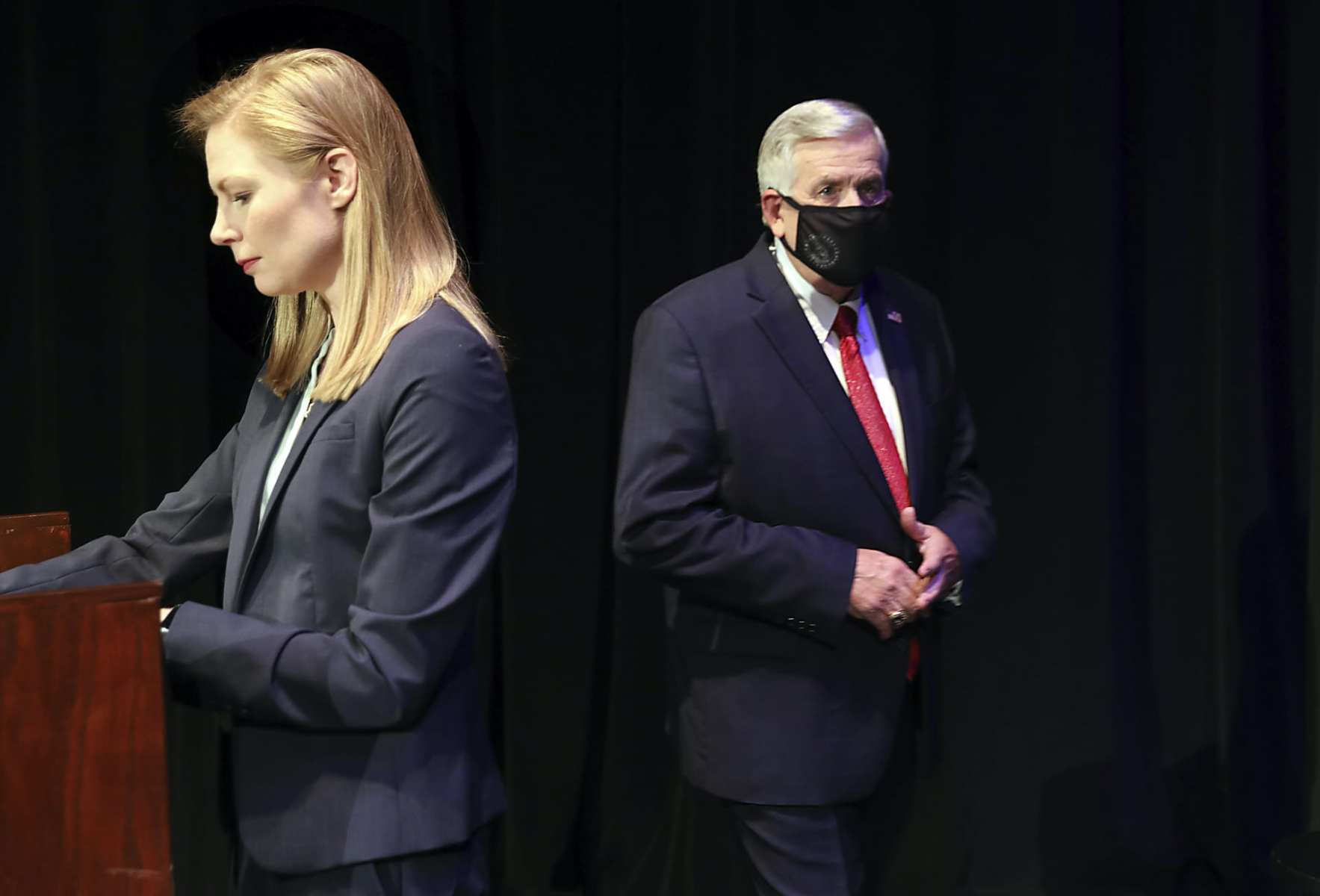We’re the only newsroom dedicated to writing about gender, politics and policy. Subscribe to our newsletter today.
For two years now, Nicole Galloway has been the only Democrat in statewide office in Missouri.
She is also the only woman.
Now, the certified public accountant and fraud examiner, who has exposed more than $350 million in taxpayer dollars that have been wasted or misused over her five years as state auditor, is aiming to go where no woman in Missouri has ever gone before: the governor’s mansion.
“You could write down a dream candidate on paper, and Nicole Galloway would still be better,” said Democratic Governors Association (DGA) spokesperson Christina Amestoy, who praised Galloway for being a “strong steward” of taxpayer money.
Presidential election years are challenging for Democrats in gubernatorial races generally. In Missouri specifically, electing Democrats to statewide office has become a herculean task. The state’s current governor up for re-election, Mike Parson, is a Republican, as are the state’s lieutenant governor, secretary of state, treasurer and attorney general. Former Sen. Claire McCaskill was the only other Democrat — and woman — in statewide office until she lost her seat in 2018, a year that was otherwise favorable to the party nationally. President Donald Trump won the state by nearly 20 points in 2016 when he beat Democrat Hillary Clinton.
There are only 11 states with gubernatorial elections this year. Democrats currently serve in four — Delaware, Montana, North Carolina and Washington — and are favored to win everywhere but Montana, which is rated as a toss-up race by the nonpartisan Cook Political Report. In the states currently held by Republicans — Indiana, Missouri, New Hampshire, North Dakota, Utah, Vermont and West Virginia — not even Missouri is rated as a toss-up, but as a race that “leans” Republican.
“The DGA’s map is tough this year,” Amestoy acknowledged.
Women are also more under-represented in states’ top executive posts than in other elected positions such as the U.S. Congress. In 2020, women comprised 26 percent of the Senate and 23.2 percent of the House of Representatives but just 18 percent of state governors. There are currently nine women governors — the record who have served concurrently, first set in 2004, then again in 2007 and 2019 — in Alabama, Iowa, Michigan, Kansas, Maine, New Mexico, Oregon, South Dakota and Rhode Island, according to the Center for American Women and Politics at Rutgers University. Over the years, 30 states have been represented by 44 women — 26 Democrats and 18 Republicans — but Missouri is one of the 20 that has never elected a woman to its top executive position.
When Galloway, 38, got into the governor’s race in August 2019, she emphasized her record exposing fraud and public corruption as auditor. Just a year earlier, in 2018, Missouri was roiled by political scandals that prompted the resignation of then Republican Gov. Eric Greitens, who was facing impeachment proceedings. Parson, the lieutenant governor at the time, took his place.
Greitens had been indicted in two separate matters: one for computer tampering after his campaign allegedly obtained a donor list from a veterans nonprofit he had founded without its knowledge; another for allegedly blackmailing a woman with whom he had an extramarital affair by threatening to release nude photos of her if she came forward. The charges were later dropped.
“It’s my job to be an independent watchdog for taxpayers,” Galloway said in a launch video that featured her three young sons. “Dark money flows from corporations and lobbyists, the governor takes their money, then does their bidding, nothing gets done for you, so it’s no wonder your healthcare costs are still through the roof, wages are still lagging.”
Galloway said in a recent interview that she knew from the moment she entered the race that “health care was always going to be a top issue.”
“However, I think COVID has exposed cracks in our system that have existed for a long time and have heightened folks’ sensitivity and awareness to the lack of access to health care in this state,” she said.
As of October 25, more than 2,800 Missourians had died from the COVID-19 virus, including 209 within the prior week. There have been nearly 175,000 cases in the state since the beginning of the pandemic and new cases were rising, according to a New York Times national tracker of the virus using government health data.
Parson, who had declined to issue a statewide mask mandate, had himself become infected with the virus, along with his wife and members of his staff, prompting the delay of the first and only gubernatorial debate between the two candidates. Public approval of his handling of the pandemic had dropped from 60 percent in April to 39 percent in late August, according to a consortium of academic researchers at Northeastern University, Harvard University, Northwestern University and Rutgers University.
Even still, the few independent polls that exist show Parson leading Galloway, though internal polling done by Democrats shows a closer race. Galloway won her 2018 race by 6 points — the same year that McCaskill lost to Republican Josh Hawley by roughly the same amount.
Terry Smith, a political science professor at Missouri’s Columbia College, said that COVID-19 and pandemic response remains a “very partisan issue” in the state. He praised Galloway’s credentials and campaign but said “one of Nicole’s problems is that she hasn’t, in my view, found an issue she’s been able to get traction on — and if there was going to be one, it was going to be this.”
At a recent meet-and-greet in Lee’s Summit, a conservative-leaning suburb of Kansas City, the COVID-19 pandemic was on most everyone’s mind. The president had just announced he had the virus, along with first lady Melania Trump. Galloway said that she does not “come from a political family” and “never expected to be running for governor.” But Parson is “not addressing COVID and he’s not addressing the high cost of health care,” she said.
Missourians passed a measure in August that would expand the state’s Medicaid system under the Affordable Care Act. Parson opposed the measure, which has yet to be implemented, and Galloway has said he cannot be trusted to do so. On the campaign trail, she frequently talks about how Medicaid expansion is key to protecting lower-income children with pre-existing medical conditions, a need that has only been exacerbated by the pandemic.
“I have a message for Governor Parson: if you mess with my children, I will have a word with you. If you mess with Missouri’s children, I will build an army and I will win,” Galloway said in Lee’s Summit.
Nicki McGrew, 38, said at the meet-and-greet that when she and her husband moved to the area five years ago to raise their young family they noticed that Democrats in the area “tend to be quiet” about their political affiliation. But they have gotten more involved in politics after “we kind of got hit in the head with Trump winning the last election.”
“It made us pay more attention to state and local races,” she said.
McGrew said as a Democrat in Missouri she is used to her party losing, but Galloway “has the best chance of winning of anyone.”
Like in many races this year, Galloway’s chances to unseat Parson could come down to turnout, and Smith from Columbia College said there is enthusiasm on both sides.
“Whether she wins or loses, she has a very promising political career — we haven’t seen the last of Nicole Galloway,” he predicted.






